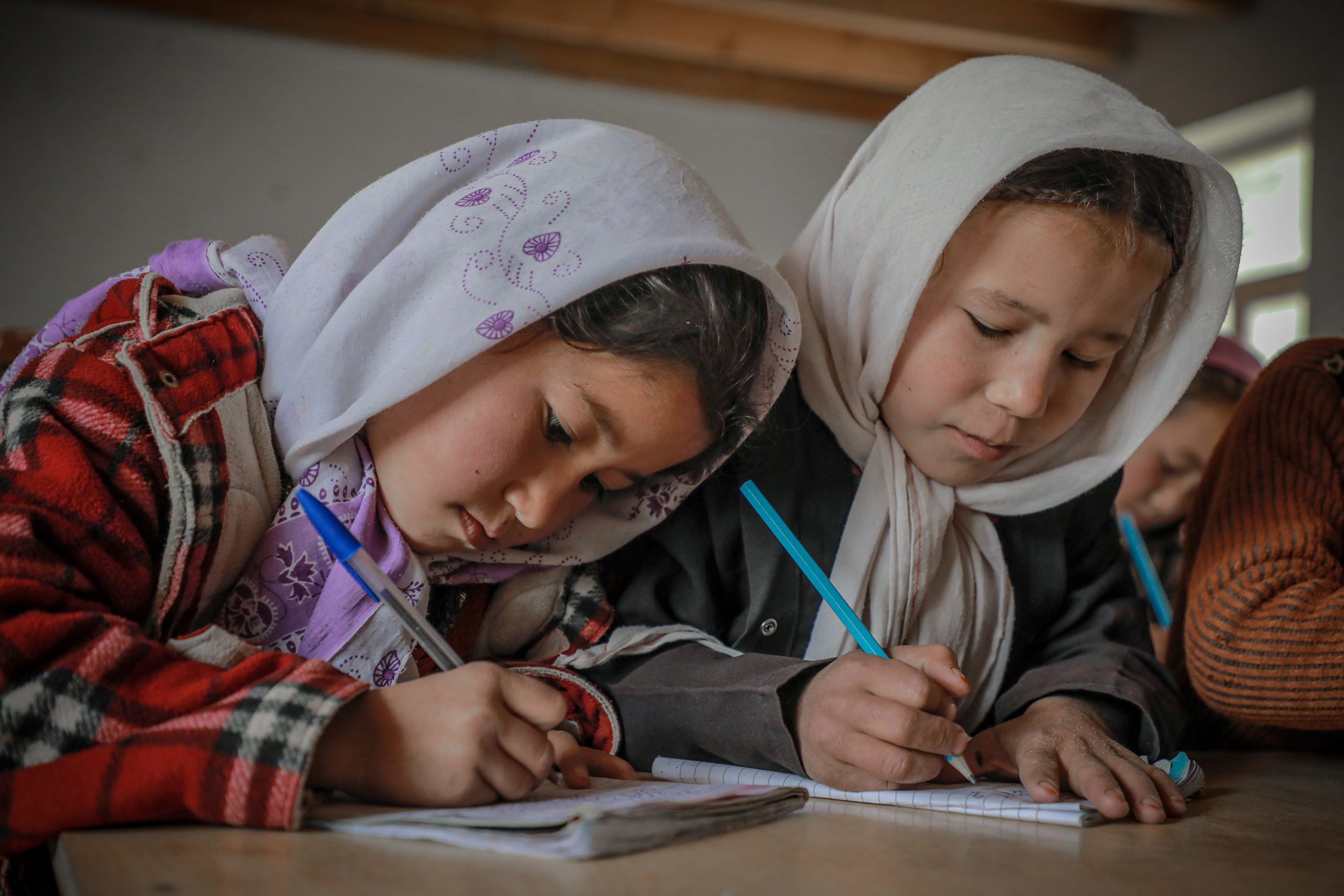Learning
Afghan Religious Scholars Criticize Girls’ Education Ban

JALALABAD, Afghanistan – Afghan religious scholars criticized a ban on girls going to school on Saturday, while a top Taliban minister told clerics not to go against the government on the controversial issue.
Girls in Afghanistan aren’t allowed to go to school past the sixth grade, and this rule goes all the way up to universities. Women are prohibited from entering public places, including parks, and working in most occupations. According to the UN, Afghan women were forbidden from working at the organization last week, though the Taliban has yet to make a public declaration.
The government says that the restrictions on education are temporary suspensions rather than bans, but universities and schools started up again in March without women students.
The sanctions have sparked international outrage, further isolating the country when its economy has crumbled, and a humanitarian catastrophe has worsened.
On Saturday, two well-known Afghan religious scholars suggested that authorities reconsider their decision. Even though some Taliban commanders have said they don’t like how decisions are made, the public rarely disagrees with Taliban policies.
Abdul Rahman Abid is a researcher who thinks colleges should be able to re-admit girls and women through separate classes, hire female teachers, push back schedules, and even build new facilities.
He told The Associated Press that knowledge is required in Islam for both men and women, and women are permitted to study.
Well-known Afghan religious scholars suggested that authorities reconsider their decision.
“My daughter is absent from school, I am embarrassed, and I have no answer for my daughter,” he explained. “My daughter wonders why girls are not permitted to attend school in the Islamic system.” “I don’t know what to say to her.”
He stated that reform is required and cautioned that delays are detrimental to the global Islamic community and the government.
Another Taliban expert told the AP that there is still time for ministries to address the issue of girls’ education. Toryali Himat mentioned ministries affiliated with the supreme leader, Hibatullah Akhundzada, based in Kandahar.
The government prohibited girls from classrooms on his command. According to Himat, there are two types of criticism: Destructive and corrective.
Islam allows both men and women to learn, but hijab and curriculum should be taken into account.
“Islam allows both men and women to learn, but hijab and curriculum should be taken into account,” Himat remarked. “Corrective criticism should be provided, and the Islamic emirate should consider this.” There is the risk of corruption where there is no criticism. “In my opinion, girls should be educated to the university level.”
Acting Higher Education Minister Nida Mohammad Nadim stated on Friday that clerics should not oppose government policies.
After another professor, Abdul Sami Al Ghaznawi told students at a religious institution that there was no disagreement over girls’ education, he made his statements. He claimed that Islamic scripture made it plain that girls’ education was permissible. Al Ghaznawi could not be reached for comment right away.
By referencing “an honorable scholar” at the top of a video message shared on social media, Nadim targeted Al Ghaznawi.
“What happened because you encouraged people to rebel?” Nadim stated. “Consequently, rebellion against this (ban) is permitted.” Will encouraging individuals to struggle against the system benefit Muslims?”
The minister could only be reached for comment later. His spokesman, Hafiz Ziaullah Hashimi, acknowledged Nadim’s remarks but did not elaborate on who they were directed at or why they were made.
SOURCE – (AP)
Post Disclaimer
The above article is sponsored content any opinions expressed in this article are those of the author and not necessarily reflect the views of VORNews. For more information on our sponsored content policy click here.
Learning
Importance of Fast Plumbing Services: Delivering in Just 30 Minutes

The plumbing services industry is about to grow by 2% annually by 2031. With the advancement of technologies, the introduction of smart homes and bathrooms is all set to boost the demand for smart plumbing fixtures shortly. Hence, this makes the plumber’s career more stable, envisaging constant learning and providing hands-on experience in using new technologies.
Plumbing issues are a part of every building; they are unpredictable and may lead to water and property damage. Hence, instead of performing DIY repairs, hiring expert plumbers in Noida will always work. However, finding reliable and affordable plumbers is challenging; therefore, many homeowners hire inexperienced ones. It may temporarily resolve the issues but won’t work for the longer term.
Therefore, always hire experts with years of experience in the same field who can provide quality services even in an emergency. Below, know the importance of fast plumbing services in Noida.
Benefits of Fast Plumbing Services
Since ancient times, plumbing has held immense importance. It assesses the water that comes in and goes out of any building properly. Plumbing services are mainly associated with water-related home repair services and must be tackled promptly and quickly. Hiring plumbers in Noida is beneficial as they ensure they visit your doorstep within 30 minutes of your booking and deliver quality results. The following are the benefits of hiring fast plumbing services:
Availability
Maximum plumbing issues must be tackled quickly before they turn into disasters. The professionals offering fast plumbing services are available anytime to provide quality work. Hence, you needn’t wait hours or days to repair a burst pipe.
Flexibility
Irrespective of time, these plumbers in Noida are ready to help within 30 minutes at your address. These experts work around the clock and employ modern tools and equipment to handle all the issues quickly. Even if you work in the graveyard shift, you can schedule and hire them at your convenience.
Real-Time Solution
Emergent plumber services in Noida provide fast plumbing solutions before the situation worsens; otherwise, the repair will cost you more. In the hustle and bustle of life, the homeowners don’t want to wait for long and rely on word-of-mouth or flipping the telephonic directories. With technological advancements, everyone can easily hire plumbing experts with just a few clicks.
Promptness
Many plumbing service industries have years of experience. Hence, they know that many plumbing issues demand immediate attention, which helps prevent severe damage. These service providers let you connect with experts who match your home needs and visit your doorstep within 30 minutes.
Emergency Training
The professionals regularly undergo varied training and keep themself learning about the latest trains and technologies to use in emergency cases.
Know the Emergency Plumbing Cases
Homeowners can’t differentiate between the emergency and the common issues. The following are the emergency plumbing cases you must consider and resolve as soon as possible:
Overflowing Toilet
An overflowing toilet is considered an emergency plumbing case only if it doesn’t stop until you push the flush; in case it doesn’t work, hiring fast plumbing services in Noida is the best way to resolve the issue, as these plumbers use a drain snake or hydro-jet to fix the problems.
No Water Pressure
If there’s no water pressure, it indicates a leak in your home. It also signifies that your pipe has burst, wasting water that should be resolved immediately to prevent serious issues.
No Hot Water
Hot water is essential for washing dishes and taking showers, but if the heater is not working, there is a chance that the water line is leaking or the heat exchanger has failed. Thus, it’s not an issue that one can wait before it can addressed.
Multiple Clogged Drained
A blocked drain is a nightmare for many homeowners. Maybe there’s an issue with the sewer line. In this case, you must immediately search for the best plumbing services to tackle the problems.
Final Words
Instant plumbing services are pivotal in integrating, maintaining, and functionalizing the home plumbing system. The demand for fast plumbing services is increasing with the increasing demand for smart home fixtures and technological advancements.
Hence, hiring plumbers in Noida is the best decision, as they can visit your address within 30 minutes of booking to provide you with quality solutions. Also, they offer varied benefits such as on-time availability, flexibility, real-time solutions, and promptness. Therefore, safeguard your home from unforeseen plumbing emergencies at the most economical price.
People Also Reading:
Eid ul-Adha 2024: Celebrating Faith, Sacrifice, and Unity in the Muslim World
Unlocking the Mystery of 5201314: Exploring the Symbolism of Love and Eternity
Post Disclaimer
The above article is sponsored content any opinions expressed in this article are those of the author and not necessarily reflect the views of VORNews. For more information on our sponsored content policy click here.
Learning
Lusha Lead Generation Script: Crafting Effective Sales Conversations

In the realm of sales, having a well-crafted script can make all the difference between a missed opportunity and a closed deal. A lead generation script serves as your roadmap to engaging prospects, addressing their needs, and ultimately converting them into loyal customers. Here’s how you can leverage a lusha b2b contacts database lead generation script to elevate your sales game and boost your revenue.
1. Choose Sales Script Type
Select from a Variety of Sales Script Templates
Choosing the right sales script template sets the foundation for successful conversations. Whether you’re engaging with potential clients over the phone, through email, or in person, our diverse range of templates ensures you have the perfect framework to fit your sales approach.
2. Fill Out the Template
Utilize Prep Questions to Craft Compelling Scripts
Effective sales scripts are more than just words – they are structured to resonate with your audience. Our templates include preparatory questions that prompt you to think critically about your customer’s pain points, desires, and objections. This ensures your script is not only persuasive but also highly relevant to your prospect’s needs.
3. Generate Your Script
Access a Complete Script with the Click of a Button
Once you’ve filled out the template, simply click “generate” to receive a comprehensive sales script tailored to your specifications. This automated process streamlines script creation, saving you valuable time while ensuring consistency and clarity in your messaging.
Crafting an Effective Sales Script
Building a personalized sales script has never been easier. Follow these steps to create a script that resonates with your prospects:
- Structure Based on Best Practices: We adhere to proven sales methodologies to structure scripts that effectively communicate value and address objections.
- Prep Questions for Insightful Answers: Start with preparatory questions designed to elicit accurate responses that directly address customer concerns.
- Organize Your Thoughts: Use our guided answers to organize your ideas cohesively, ensuring your script flows naturally and persuasively.
Benefits of Using Our Sales Script Generator
Enhance Your Sales Effectiveness with lusha Free Tool
Our sales script generator empowers salespeople worldwide with tools to build stronger pitches and drive better results. Here’s why you should start using it today:
- Improve Lead Qualification: Streamline the process of identifying and qualifying leads through structured conversations.
- Control the Conversation: Guide discussions towards desired outcomes by addressing prospect objections and highlighting value propositions effectively.
- Prepare for Objections: Anticipate and handle objections with confidence using prepared responses tailored to common scenarios.
- Maintain Consistency: Ensure every interaction aligns with your brand message and sales goals, promoting a cohesive customer experience.
- Confidence to Start Calls: Equip yourself and your team with well-prepared scripts that instill confidence and professionalism from the first call.
Yes! lusha lead generation script builder is completely free and designed to support sales professionals in crafting impactful conversations that drive conversions. Download or save your pitch script today to start closing more deals and achieving your sales objectives.
In conclusion, mastering the art of lead generation starts with a well-crafted sales script. Leverage lusha sales script generator to create personalized, persuasive scripts that engage prospects, address their concerns, and ultimately propel your business towards success. Start scripting your success story today!
People Also Reading:
Unlocking the Mystery of 5201314: Exploring the Symbolism of Love and Eternity
What is Pi123 ? Exploring its Features and Benefits
Post Disclaimer
The above article is sponsored content any opinions expressed in this article are those of the author and not necessarily reflect the views of VORNews. For more information on our sponsored content policy click here.
Learning
What is Pi123 ? Exploring its Features and Benefits

One constant sticks out in the fascinating realm of mathematics, where numbers dance through equations and reveal the mysteries of the cosmos: pi. Pi123, defined as the circumference divided by the diameter of a circle, is a mathematical constant that fascinates scientists and mathematicians alike.
This irrational number, roughly equivalent to 3.14159, is important in many mathematical calculations and may also be seen in natural patterns. In this blog, we also comprehend what Pi123 is and its importance.
The Core of Pi123
Pi is more than simply a number; it’s a phenomenon and an enigma that exists beyond reason. Although it can be precisely determined using various mathematical methods, Pi is an irrational number. This intriguing quality is the foundation for Pi123, an online application created to precisely and easily untangle Pi’s endless digits.
Presenting Pi123
Pi123 is an online calculator that can compute pi to decimal places. It’s much more than just a calculator, however. Pi123 is your go-to partner whether you’re a teacher mentoring the future generation of mathematicians or a student exploring the subject’s complexities. A peek into what sets Pi123 apart in the digital space of mathematical research is this:
- Fast Calculations: Pi123 guarantees quick calculations, making it simple for users to get exact values of pi.
- Interface That’s Easy to Use: Pi123 is easy to use and may be accessed by mathematicians of all skill levels.
- Store and Share: To help with learning and teamwork, the tool has a handy function that allows you to store and share your computations.
- Long History: Pi123 maintains a thorough record of all the calculations you have made in the past, giving you a mathematical journey.
The Significance of Pi123
Pi123 is a doorway to mathematical discovery, not merely a tool. Pi may be calculated to any decimal point, which leads to fresh discoveries and insights. Whether delving into the depths of geometry or solving the riddles of calculus, Pi123 is a beneficial tool for all your mathematical pursuits.
Connecting the Dots: How to Sign Up for the Ekart Partner Center
Identifying more opportunities for development and cooperation is critical as we explore the realm of mathematics. The Ekart Partner Center is one such possibility. See this comprehensive guide for information on how to join this center and join a thriving business endeavor.
Final Thoughts
Pi123 shines as a light in mathematics, showing the way to accuracy and discovery. With unmatched simplicity, Pi123 allows you to study the infinite decimals of pi as a student, teacher, or passionate math lover. Accept the beauty of numbers and use Pi123 as your guide to explore the vast world of mathematical mysteries.
Common Questions Regarding Pi123
What is the purpose of pi?
Pi has been used in a wide range of mathematical and scientific fields. It is mostly used in geometry to indicate the circumference’s ratio to a circle’s diameter. Pi also appears in many mathematical formulae from many mathematics, physics, and engineering fields.
2. To put it simply, what is pi?
Simply put, pi is the number that expresses the relationship between the diameter and circumference of a circle. This number, which is irrational and roughly equivalent to 3.14159, has an infinite decimal form that never ends.
3. Is the value of pi real?
Pi is a real number, yes. It is also an irrational number, precisely, and a mathematical constant. When it is irrational, its decimal form is non-terminating and non-repeating. Despite this, pi is a very real and significant mathematical notion.
4. What’s the ratio of pi?
The connection between a circle’s diameter and circumference is known as the pi ratio. The Greek letter π (pi) represents it mathematically, and its approximate value is 3.14159. The pi ratio is one basic constant often employed in geometry and other mathematical computations involving circles.
More Related:
Elon Musk Confirms 12th Child with Neuralink Executive Shivon Zilis
Post Disclaimer
The above article is sponsored content any opinions expressed in this article are those of the author and not necessarily reflect the views of VORNews. For more information on our sponsored content policy click here.
-
World2 weeks ago
Former President Trump Survives Being Shot at Pennsylvania Rally
-
Tech4 weeks ago
Huawei Launches 5G-A Pioneers Program at MWC Shanghai 2024: Paving the Way for a Connected Future
-
Tech4 weeks ago
ChatGPT Answers Undiscovered Questions and Outperforms Students.
-
Sports4 weeks ago
NBA Draft: Kyle Filipowski Withdraws Unexpectedly From The First Round
-
News4 weeks ago
US Supreme Court Rejects Drug Deal that Protects the Sackler Family
-
Health4 weeks ago
US Health Agency Issues Dengue Virus Infection Warning























